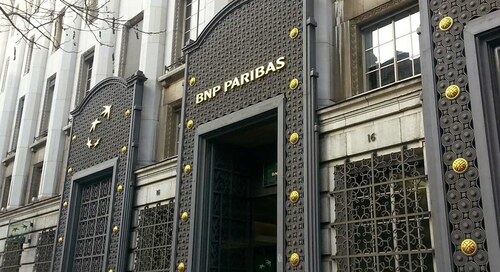BNP Paribas reste bénéficiaire à hauteur de 1,28 milliard d’euros
La première banque européenne a, comme la Société Générale, souffert de la chute de ses activités de marché, notamment des produits dérivés sur actions. La suspension des dividendes exigée par plusieurs autorités européennes lui a fait subir une perte de 184 millions sur ses produits structurés. La baisse des marchés d’actions en mars a par ailleurs entraîné des pertes comptables de 384 millions d’euros sur les portefeuilles détenus par sa branche d’assurance.
Le 5 mai dernier, le groupe a annoncé une baisse de 33,2 % de son bénéfice net au 1er trimestre en raison de l’impact de la crise sanitaire qui a violemment frappé l’économie mondiale et les marchés financiers. Son résultat est néanmoins resté bénéficiaire à hauteur de 1,28 milliard d’euros sur la base d’un produit net bancaire de 10,90 milliards.
Le coût du risque, mesurant les pertes attendues sur les crédits accordés, affiche une hausse de 85,4 %, à 1,4 milliard au cours des trois premiers mois de l’année. Cet indicateur devrait fortement augmenter en 2020, bien que BNP Paribas n’ait pas encore fourni de prévision chiffrée.
Une baisse attendue de -15 à -20 % du résultat net cette année
Dans un communiqué, la banque indique que son résultat net pourrait diminuer de 15 à 20 % en 2020 par rapport à 2019, « sauf nouvelle crise ou nouveaux développements ». Selon les analystes, cette prévision est supérieure au consensus ce qui pourrait se traduire par des révisions à la hausse des prévisions des investisseurs.
Lors de la conférence investisseurs, le directeur général de BNP Paribas, Jean-Laurent Bonnafé, a précisé que la baisse des frais de gestion sera amplifiée dans les prochains mois dans l’objectif de réaliser « 300 à 500 millions d’euros d’économies supplémentaires ». Cette annonce fait suite au plan de réduction de coûts de 600 millions d’euros mené l’an dernier.
Malgré le choc encaissé sur les produits structurés, le modèle diversifié de BNP Paribas lui a permis de résister. Si ses performances restent inférieures à celles de certaines rivales européennes comme Barclays et UBS, la banque figure parmi les plus équilibrées du secteur. Pour faire face à la crise sanitaire actuelle, le groupe peut compter sur ses réserves de capitaux abondantes. En effet, son ratio de fonds propres CET1 est nettement supérieur au minimum réglementaire, à 12 % fin mars, contre 12,1 % fin 2019.
